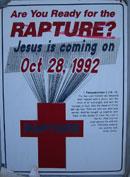The end is near – the Apocalypse is coming. Don’t worry, though. This has all happened before.
Back in 1968, the Governing Body of the Jehovah’s Witnesses told its members that the Apocalypse would come in 1975. Witnesses began to sell their houses and join the proselytizing ‘pioneer service’ for the last days of judgment. They sent out magazines with pictures of secular babies being slaughtered and the wicked elderly engulfed in flames. Like all good things, however, this feverish orgy of righteousness came to an end.
Witnesses awoke on January 1st 1976 to find all the secular babies un-slaughtered. Some decided to leave the organization. Many others did not. Many of those that remained stopped mentioning the unfulfilled prophecy even amongst themselves. To this day, Jehovah’s Witnesses who were alive at the time, Witnesses who sold their homes and entered pioneer service, deny that any such prophecy ever existed.
Behavior like this provides a puzzle for social psychologists. How could otherwise healthy and rational people fail to appreciate or even acknowledge such flagrant evidence that their previous beliefs were false? Psychologists refer to such events as ‘disconfirmed expectancies,’ and they are far more prevalent than you might expect. Nearly every major religion has experienced unfulfilled prophecies at some point in their past.
The Jehovah’s Witnesses themselves had two prior unfulfilled prophecies in 1914 and 1925. In 1956, a small religious organization prophesied that the earth would be destroyed in a great flood and that they alone would be rescued by a flying saucer on December 20 th. When December 20th came and went, the faithful didn’t give up their beliefs, but instead grew more insistent than ever that the earth would be flooded and launched an advertising campaign to convince others as well.
The social psychologist Leon Festinger watched the activities of this particular religious organization with fascination. He wondered why the failure of their prophecy would make them more, rather than less, adamant about their beliefs.
Festinger came up with a theory called ‘Cognitive Dissonance,’ which states that the human mind, in attempting to come to a coherent understanding of the world, has the tendency to eliminate contradictory thoughts, behaviors, or emotions. He called a contradictory state ‘dissonant,’ and a coherent state ‘consonant.’ The theory of Cognitive Dissonance, then, states that the mind has a tendency to minimize or eliminate dissonance.
To test this hypothesis, Dr. Festinger performed an experiment in which subjects were asked to perform several dull and apparently purposeless tasks. They were told to sit with another subject and try to convince them that the tasks were actually interesting. Some of these people were paid $20, while others were paid $1. When these subjects were asked what they thought of the experiment, the $20 group said that it was boring and pointless. But the $1 group said that the tasks were actually interesting.
The theory of Cognitive Dissonance explains this behavior by saying that, in the $20 case, people had a good reason for lying to the person they were trying to convince – they were being paid a lot for it. While in the $1 case, people did not really have any good reason for lying, but found themselves lying anyway. Their behavior was at odds with their thoughts and emotions, and the easiest way to get rid of the contradiction was to just change their attitudes.
When your brain represents the world, it has to piece all its data together into a single picture – like putting together a trillion piece jigsaw puzzle in an couple of seconds. And if it has two pieces of information that don’t seem to fit, it will wiggle them together, tear the edges, or just plain throw the piece away. What’s frightening about this fudge-job is that our brains don’t only represent the outside world, they represent us as well – our thoughts, desires, and opinions.
So when the piece of our behavior just doesn’t seem to fit our beliefs, our brains may very well just toss the belief. In the wake of these ‘disconfirmed expectancies,’ people are put in a profound state of dissonance. All their previous emotions and behavior indicate that either Jesus or the space aliens are coming. When they are presented with the contradictory thought that they are not actually coming, the easiest way to eliminate the dissonance is to just eliminate the thought.
However, as Festinger’s mundane experiment indicates, this psychological phenomenon extends beyond eccentric religious organizations. It influences our thinking in day-to-day life. It causes us to ignore, forget, or flat out deny any information or feelings that go against our pre-conceived notion of the world.





















































